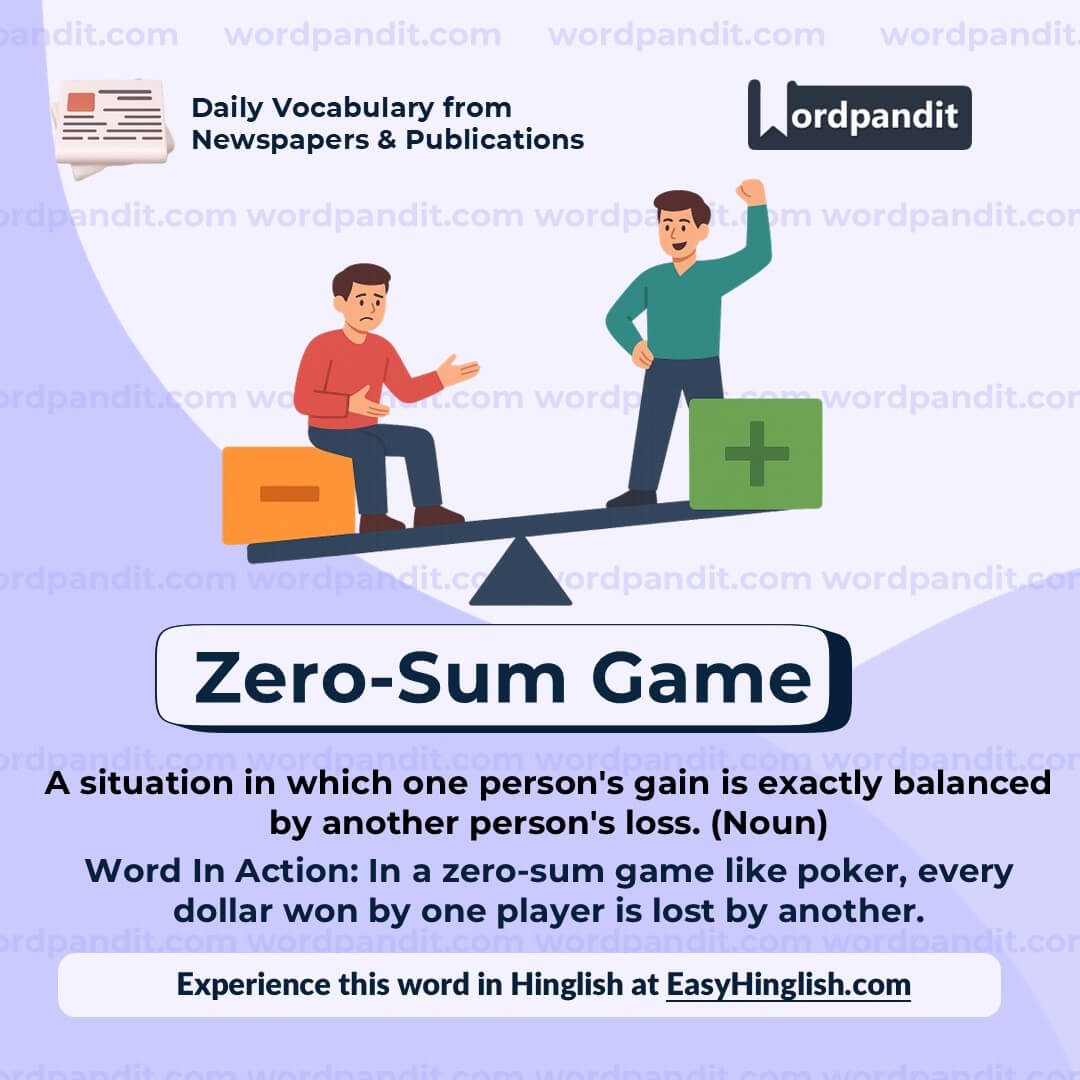Daily Vocabulary from Indian Newspapers and Publications
Welcome to Wordpandit’s Indian Vocabulary Hub
At Wordpandit, we understand the importance of staying rooted in the local context while expanding your language skills. This section focuses on enriching your vocabulary with words and phrases drawn from India’s leading newspapers and publications, ensuring you're learning vocabulary that is practical, relevant, and uniquely Indian.
Why Indian Sources Matter
We believe that the best way to master any language is by immersing yourself in local content. That’s why we carefully curate vocabulary from top Indian publications, including:
- The Hindu
- The Times of India
- The Economic Times
- Hindustan Times
- Live Mint
- The Indian Express
- And many others...
Stay Updated, Stay Relevant
With daily updates from Indian news sources, you’ll be consistently learning words that reflect the trends and shifts in Indian society and culture. Our focus is to provide vocabulary that enhances your understanding of the language in an Indian context.
How Wordpandit Supports Your Goals
Whether you’re preparing for exams, aiming to improve your professional communication, or simply want to stay connected with the latest Indian vocabulary, Wordpandit is here to guide you every step of the way.
Learn with a Practical Approach
Our interactive learning methodology includes real-world examples, engaging activities, and context-specific usage to ensure that every word becomes part of your active vocabulary.
Dive into Indian Vocabulary Today!
Why Choose Wordpandit?
Practical Learning: Focus on words you'll actually encounter in real-world reading, enhancing your comprehension and communication skills.
Diverse Content: From current affairs to scientific breakthroughs, our varied sources expose you to vocabulary across multiple domains.
Effortless Integration: Make Wordpandit a part of your daily routine. Just a few minutes each day can significantly boost your lexicon over time.
Your Path to Vocabulary Mastery
- Visit our Daily Vocabulary section regularly
- Explore new words and their usage in context
- Practice incorporating these words into your own writing and speech
- Track your progress as your vocabulary expands
Start Your Journey Today
Embark on your vocabulary enhancement journey with Wordpandit. By consistently engaging with our daily posts, you'll build a robust vocabulary that serves you well in academic, professional, and personal contexts.
Remember, a word a day keeps linguistic limitations at bay. Make Wordpandit your daily companion in the quest for vocabulary excellence!
WORD-1: Linger
Context:
"A lot is discussed and debated about death and dying, and how most of us are so fearful of the end. Will it be painful? Will the end be sudden and peaceful or violent? Will I linger on, ailing in hospital, with life support?" - The Times of India
Explanatory Paragraph:
The word “linger” refers to staying in a place or situation for longer than expected or desired. It can suggest a physical delay, like someone hanging around after an event ends, or an emotional or mental continuation, like memories that refuse to fade. In the context of life and death, “linger” evokes a haunting image of someone not being able to let go—either of life or suffering—often extended by medical intervention or emotional attachment.
Meaning: To stay longer than necessary or delay leaving (verb)
Pronunciation: LIN-ger
Difficulty Level: ⭐⭐ Beginner
Etymology: From Middle English *lengeren*, frequentative of *lengthen*, from Old English *lengan*
Prashant Sir's Notes:
“Linger” is a gentle yet powerful word. It captures emotional depth, especially when describing people who stay behind physically or emotionally. Think of moments, smells, songs, or even people who “linger” in our minds—hard to forget, slow to fade.
Synonyms & Antonyms:
Synonyms: stay, remain, wait, dawdle, loiter, hang around
Antonyms: leave, depart, hurry, rush, flee
Usage Examples:
- The scent of her perfume lingered long after she had left the room.
- He lingered at the door, unsure if he wanted to say goodbye.
- The sadness lingered in his eyes even as he tried to smile.
- Tourists lingered around the monument, reluctant to leave the beautiful view.
Cultural Reference:
"I lingered round them, under that benign sky: watched the moths fluttering among the heath and harebells..." – *Wuthering Heights* by Emily Brontë
Think About It:
Why do some emotions, like guilt or love, tend to linger longer than others? What makes them so sticky in our minds?
Quick Activity:
Write a short paragraph describing a place or person that “lingers” in your memory. Try to use the word "linger" or "lingering" naturally in the text.
Memory Tip:
Imagine someone “lingering” by the doorway, leaning on the wall, not quite ready to leave. The “lin-” sounds like “lean”—someone leaning around, not moving on.
Real-World Application:
In healthcare discussions, the word “linger” is used when talking about end-of-life situations. In marketing, scents or messages that “linger” are seen as effective. Emotionally, it’s a key word in poetry and songwriting to describe lasting impact.
WORD-2: Feeble
Context:
"In reality, most of us are as fearful of living as we are of death. What if I live long years, turning feeble and disabled, and what if I become completely dependent on others for my sustenance and daily tasks?" - The Times of India
Explanatory Paragraph:
The word “feeble” is used to describe something that is weak—whether physically, mentally, or even metaphorically. It often paints the picture of someone lacking strength, either due to age, illness, or frailty. In a broader sense, it can also refer to arguments or efforts that are not convincing or powerful. In this context, it refers to the physical weakness that can come with aging, evoking a fear of losing independence and strength over time.
Meaning: Lacking physical strength or vigor; weak (adjective)
Pronunciation: FEE-buhl
Difficulty Level: ⭐⭐ Beginner
Etymology: From Old French *feble*, from Latin *flebilis* meaning “lamentable,” ultimately from *flēre* meaning “to weep”
Prashant Sir's Notes:
“Feeble” can apply to the body, mind, or even abstract concepts like excuses or efforts. It’s a useful word for expressing not just physical frailty but also emotional or intellectual lack of strength. Be careful with tone—it can sound dismissive if not used thoughtfully.
Synonyms & Antonyms:
Synonyms: weak, frail, delicate, infirm, powerless, fragile
Antonyms: strong, robust, powerful, sturdy, vigorous
Usage Examples:
- Her voice was feeble, barely audible over the noise of the crowd.
- The feeble attempt to fix the leak only made it worse.
- He gave a feeble smile, trying to hide his pain.
- After weeks of illness, she felt too feeble to get out of bed.
Cultural Reference:
"The spirit indeed is willing, but the flesh is weak." – This biblical reference captures the contrast between desire and feebleness of the body, often quoted in discussions of aging or physical decline. - The Bible (Matthew 26:41)
Think About It:
Is physical feebleness always a disadvantage, or can it teach us something about empathy, patience, and the human condition?
Quick Activity:
List three situations where a person might be called "feeble" and explain whether it's physical, emotional, or intellectual weakness.
Memory Tip:
Think of “feeble” as the opposite of “able.” Someone who is not “fully able” may be “feeble.” Both words rhyme, making it easier to remember.
Real-World Application:
“Feeble” is often used in healthcare, literature, and debates. Doctors may describe a patient’s condition as feeble, and writers may use the word to depict aging characters. In discussions or arguments, weak points are often described as “feeble excuses” or “feeble attempts.”
WORD-3: Zero-Sum Game
Context:
"It is not a zero-sum game for both sides. There are economic benefits for all. For Airtel and Jio, Starlink allows them to provide high-speed Internet to India’s most remote regions without the infrastructure costs of terrestrial networks. For SpaceX, the deal opens up a huge market." - The Hindu
Explanatory Paragraph:
A “zero-sum game” is a situation in which one party’s gain is exactly balanced by another party’s loss—what one wins, the other loses. It’s often used in economics, politics, or business to describe competitive scenarios where resources are limited. However, many modern economic relationships—like partnerships or trade deals—can be *non-zero-sum*, where all parties benefit. In the given context, the writer is emphasizing that the collaboration between companies like Airtel, Jio, and SpaceX is mutually beneficial, not a rivalry where one’s success hurts the other.
Meaning: A situation where one person’s gain is another’s loss, and the total benefit remains constant (noun phrase)
Pronunciation: ZEE-ro sum gaym
Difficulty Level: ⭐⭐⭐ Intermediate
Etymology: From game theory; “zero-sum” meaning that the total value (or 'sum') of winnings and losses equals zero
Prashant Sir's Notes:
“Zero-sum game” is often misused! It’s not just any competition—it specifically means that gains and losses cancel each other out. In debates, pointing out whether a scenario *is* or *is not* zero-sum is a powerful analytical tool.
Synonyms & Antonyms:
Synonyms: win-lose scenario, fixed-pie situation, competitive game
Antonyms: win-win situation, mutual gain, collaborative game
Usage Examples:
- Negotiating a raise doesn’t have to be a zero-sum game if the company also benefits from your improved performance.
- In many global trade agreements, the countries involved aim to avoid zero-sum thinking.
- The debate was framed as a zero-sum game, where one political party’s success came at the total expense of the other.
- Friendships and relationships thrive when people stop seeing them as zero-sum games and start seeking shared growth.
Cultural Reference:
"Life doesn’t have to be a zero-sum game." — Barack Obama, emphasizing collaboration over competition in social progress.
Think About It:
Can competition still be healthy if it’s not a zero-sum game? How can we reframe rivalries to create more win-win scenarios?
Quick Activity:
Think of two scenarios—one zero-sum and one win-win—and write one sentence explaining the difference between them.
Memory Tip:
“Zero-sum” = “zero gain for all.” If you imagine a pie, in a zero-sum game, if one person takes a bigger slice, the other gets less—there’s no way to grow the pie!
Real-World Application:
Understanding zero-sum thinking is key in business, politics, and international relations. Leaders who recognize when cooperation yields better results often avoid unnecessary conflict and foster mutual progress.
WORD-4: Terrestrial
Context:
"It is not a zero-sum game for both sides. There are economic benefits for all. For Airtel and Jio, Starlink allows them to provide high-speed Internet to India’s most remote regions without the infrastructure costs of terrestrial networks. For SpaceX, the deal opens up a huge market." - The Hindu
Explanatory Paragraph:
The word “terrestrial” generally means “related to the Earth or land.” In everyday language, it can describe things found on land (as opposed to in the sea or air). In technology and telecommunications, "terrestrial networks" refer to land-based infrastructure like fiber-optic cables, cell towers, and satellites in low orbit. In contrast, non-terrestrial networks—like Starlink—use space-based systems to beam internet to Earth. In the given context, “terrestrial” highlights the cost of building infrastructure across land, which satellite internet aims to bypass.
Meaning: Relating to the Earth or land (adjective)
Pronunciation: tuh-RESS-tree-uhl
Difficulty Level: ⭐⭐⭐ Intermediate
Etymology: From Latin *terrestris*, from *terra* meaning “Earth”
Prashant Sir's Notes:
“Terrestrial” is a beautiful word rooted in our planet. It’s commonly used in science, geography, and now increasingly in tech (especially telecom). Compare it with “extraterrestrial”—which flips the meaning completely!
Synonyms & Antonyms:
Synonyms: earthly, land-based, ground-based
Antonyms: extraterrestrial, celestial, space-based
Usage Examples:
- The rover was built to explore terrestrial terrain as a test before its Mars mission.
- Unlike terrestrial radio, satellite radio doesn’t rely on ground-based towers.
- Terrestrial ecosystems differ vastly from aquatic or aerial ones.
- As satellite internet expands, reliance on terrestrial networks may reduce in remote regions.
Cultural Reference:
In science fiction, “terrestrial” often refers to anything from Earth, distinguishing humans from “extraterrestrials” or aliens. Think of the movie *E.T. (The Extra-Terrestrial)*, where the title itself plays with this contrast.
Think About It:
As technology grows more reliant on space-based systems, will the line between terrestrial and extraterrestrial blur? How might that reshape our identity as Earth-dwellers?
Quick Activity:
List three examples of terrestrial and three of extraterrestrial objects or systems. Try to use the word “terrestrial” in at least one sentence.
Memory Tip:
Think “terra = Earth.” So anything “terrestrial” is rooted to land or Earth. Like a “terrapin” (a land turtle) or “terrain” (the land itself).
Real-World Application:
In telecom, terrestrial networks involve cables, towers, and ground stations, while satellite alternatives (like Starlink) are changing how remote regions access the internet—eliminating the need for expensive land infrastructure.
WORD-5: Zeal
Context:
"Manoj Kumar’s nationalistic zeal came forward at a time when India had undergone the trauma of fighting a war with China in 1962, and with Pakistan in 1965 and in 1971." - The Indian Express
Explanatory Paragraph:
“Zeal” refers to a strong and enthusiastic devotion toward a cause, goal, or belief. When someone acts with zeal, they do so with great energy, passion, and intensity, often driven by deeply held convictions. In the context of Manoj Kumar, it reflects his passionate commitment to patriotic themes in cinema during a period of national struggle and pride.
Meaning: Great energy or enthusiasm in pursuit of a cause or objective (Noun)
Pronunciation: zeel
Difficulty Level: ⭐⭐ Beginner to Intermediate
Etymology: From Late Latin *zelus*, from Greek *zēlos*, meaning “ardor, emulation, jealousy.”
Prashant Sir's Notes:
This word is simple yet powerful. It often appears in political, religious, or social contexts to describe passionate commitment. Think of "zeal" as fire in the belly — the fuel that drives tireless action.
Synonyms & Antonyms:
Synonyms: passion, fervor, enthusiasm, ardor, eagerness
Antonyms: apathy, indifference, lethargy, disinterest
Usage Examples:
- She pursued her medical research with unwavering zeal.
- The coach’s zeal inspired the entire team to give their best performance.
- Religious zeal can be both a uniting and a dividing force in societies.
- He campaigned for environmental causes with such zeal that he became a local hero.
Cultural Reference:
"Nothing great was ever achieved without enthusiasm." – Ralph Waldo Emerson. This quote mirrors the spirit of zeal: passion-driven achievement.
Think About It:
Is there a cause or belief you feel enough zeal for that you’d dedicate years of your life to it? What fuels that passion?
Quick Activity:
Write down three areas in your life where you could use more zeal. How might your attitude or results change if you approached them with more enthusiasm?
Memory Tip:
Think of “zeal” as a buzzing “zebra on fire”—too energetic and passionate to stand still. That’s the spirit of zeal: unstoppable energy!
Real-World Application:
“Zeal” is often used in job interviews and cover letters to describe passion for a field or company. For example, "I approach marketing challenges with zeal and creativity."



















